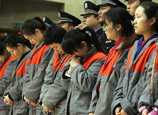
It is a consensus that people's freedom of speech should have legal and political boundaries to prevent wrongdoing
In its World Report 2013 published on Friday, Human Rights Watch, an international non-governmental organization on human rights research and advocacy headquartered in New York, continues lashing out at China, saying "its human rights record remained poor in 2012, with minimal significant progress on political, civil, socio-economic or cultural rights".
"When challenged by its citizens, repression or tactical retreat rather than systemic reform remains the Chinese government's default response," the report claimed, citing some fictional cases to denounce the Chinese government's "violation of internal and international laws". However, it also admitted that the amendments to the Criminal Procedure Law in March and the amendments to the Mental Health Law in October "were improved in key aspects as a result of intensive civil society efforts".
While accusing China of monitoring the media, the report also said that more than 300 million Chinese Internet users can express their views and discontent via Sina Weibo, China's largest micro-blogging website. Despite suffering different limits, Chinese citizens are increasingly vocal, especially online, in some cases forcing the government to make concessions or even to take their demands into account, as the report puts it.
The use of such contradictory words about China is explicit evidence that China holds a consistently supportive and open attitude toward its citizens' freedom of speech. At a time when legislation has been widely adopted across the world to impose moderate legal curbs on Web opinions, it is groundless to criticize the Chinese government for its bid to protect its citizens' freedom of speech through legal means. This is just a condescending rebuke of China by those self-proclaimed moral judges in the West and a political attempt to defame Beijing.
China has made tangible efforts to guarantee the freedom of speech for its citizens in recent years. In its National Human Rights Action Plan launched in June, the Chinese government made explicit commitments to "guarantee citizens' freedom of speech and their right of expression". At the same time, some concrete systematic arrangements and guarantee measures were drafted for the implementation of the plan. In particular, the plan confirmed that news organizations and practitioners should have access to information and enjoy their legitimate rights for interviews, publication, criticism and supervision.
 |
















 The journey is more important than the destination:Three people who opted for an adventure tell stories.
The journey is more important than the destination:Three people who opted for an adventure tell stories.


![]()
